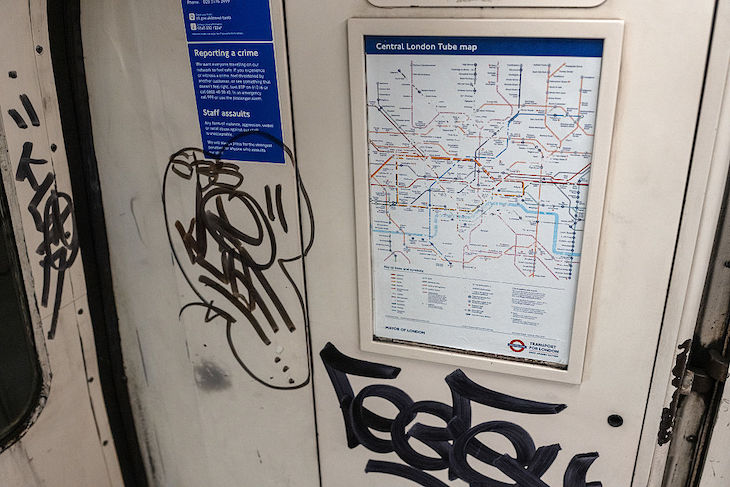Most people deplore bad behaviour in public and gratuitous breaches of etiquette and manners on trains and buses. Few would disagree with comments made yesterday by the shadow transport secretary, Richard Holden, that ‘inconsiderate and obnoxious behaviour blights the lives of the travelling public’. Yet many, contrariwise, would disagree with his proposal to remedy this scourge, namely for ‘swift justice for those who make people’s lives a misery’ through on-the-spot fines.
Under Holden’s plan to tackle the modern malaise of passengers having to ‘endure somebody else’s choice of crap music blasted through a speaker’, he wants to restore a railway bylaw – one that has fallen into abeyance – forbidding passengers from playing sounds ‘using any instrument or equipment’ which is to the annoyance of another person.
The behaviour of strangers can indeed be annoying, irksome and offensive to our eyes and ears, but it was ever thus. It is inherent to the human condition. Other people may not quite embody the experience of Hell, as the words of one French philosopher are invariably summoned on these occasions, but they can epitomise a form of purgatory: forever trying and testing, to be endured with forbearance and patience.
The idea that bad manners or offensive behaviour are a matter for state intervention is a relatively new and lamentable one. It arrived in earnest roughly ten years ago with the entry into the public arena of hyper-liberal, woke ideology, with its eagerness to censor words or punish behaviour its advocates deemed ‘inappropriate’ or ‘offensive’. This impulse remains in rude health today, as does the belief by arms of the state that it falls under their remit to enforce codes of conduct and punish what would in other times have been regarded as social transgressions.
Witness Surrey Police’s recent initiative to prosecute wolf-whistlers, or Thanet District Council’s proposal to fine people who swear if it is deemed to cause distress to those in earshot. While few would condone sexist behaviour or bad language, many have maintained for some time that being ‘offensive’ should not be a legal matter. Yet still this mentality has been permitted to evolve and spread, bringing us to the alarming state of affairs today, where, since the free deployment of ‘non-crime hate incidents’, people who say inconsiderate or obnoxious things can expect a visit from the police.
Customs and mores should never be police concern, and those who transgress them should never be apprehended or prosecuted by the state. Breaking taboos, making social transgressions, or just plain rude carry-on and antisocial incidents are acts that should be redressed by people, not the police.
The notion of upbraiding strangers for their misbehaviour – especially errant youths still requiring lessons in socialisation and refinement – began to fall decidedly out of favour with a general liberal shift in society some decades ago. This represented progress of sorts: we rarely, and thankfully, hear of ‘busybodies’ or ‘nosy-parkers’ these days, possibly because they no longer exist in great numbers.
Yet this shift brought with it obvious downsides. One which became striking in the 1980s was the end of the taboo on dropping litter. In what was probably one of the last instances of its kind, as a teenager at the tail end of that decade I was pulled up by a stranger in west London for doing precisely that. I was naturally incensed at his effrontery at the time, but it did teach me a lesson that I never forgot.
An even more wretched development in the 1980s was the emergence and proliferation of American-style graffiti, or ‘tagging’ with spray-paint aerosols. Graffiti today, like playing annoying music, remains one of the most depressing experiences of urban life, and with it can be technically dealt with by legal recourse.
Yet the fightback this year against graffiti on the London Underground – most conspicuously by Robert Jenrick, but also by legions of concerned citizens – represents a far more encouraging development. Like efforts to shame fare-dodgers on the Tube, it is an open display by individuals that misbehaviour and petty acts of vandalism are regarded by the vast majority of Britons as abhorrent and unacceptable.
We have become too willing to accept that being annoying or ‘offensive’ warrants state intervention. Shaming people is vastly preferable to prosecuting them, not least because it inoculates us all against authoritarian thinking. We do not want to continue on the same path taken by Singapore or North Korea, where in the former the sale of chewing gum is illegal and in the latter the state proscribes certain hairstyles among men.
Instead, playing music on buses should be regarded as taboo. If many rightly fear reminding youngsters as such, it should remain the duty of parents to instil in their children the necessity of good manners and consideration for others.







Comments